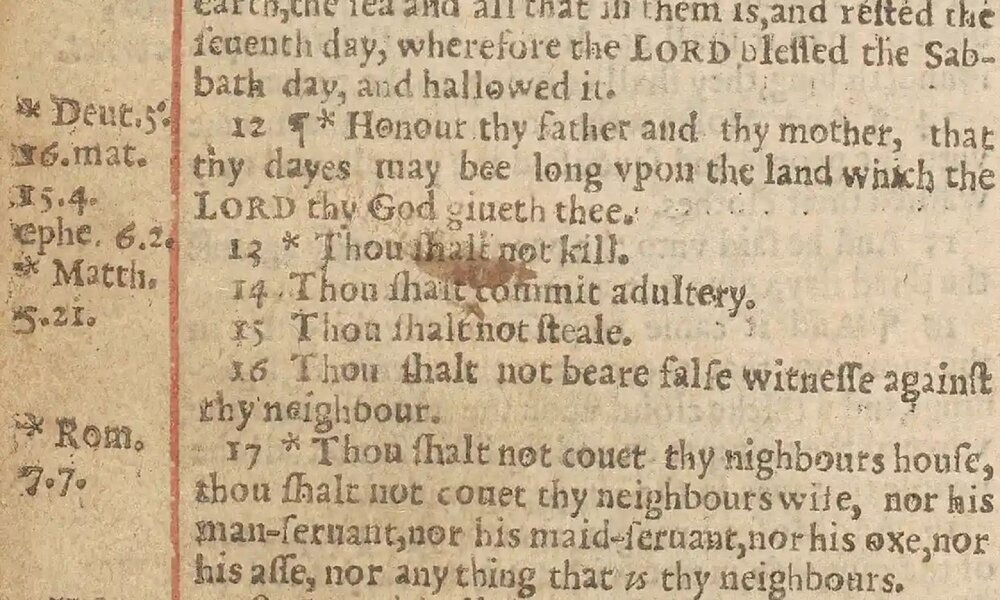Hawzah News Agency – An extremely rare bible famous for an unfortunate error that encourages adultery has been discovered in New Zealand, according to The Guardian.
The 1631 “Wicked” Bible, as it has become known, omits the word “not” from its seventh commandment, informing readers “thou shalt commit adultery”. One thousand copies of the text, which also came to be known as the Adulterous or Sinners’ Bible, were printed, with the error only discovered a year later.
Upon discovery of the mistake, the printers Robert Barker and Martin Lucas were summoned by King Charles I and hauled before the court, where they were admonished for the scandalous typo and sloppy workmanship. They were stripped of their printing licence, had a £300 fine held over their heads for years (though it was eventually quashed) and most of the texts were destroyed. Only about 20 remain in circulation.
The bibles do come up for auction from time to time mostly in Britain or US, but this is the first time one has been discovered in the southern hemisphere, says the University of Canterbury in Christchurch. The university was first informed of its existence in 2018 but chose to keep the discovery under wraps until now to allow researchers and book conservers enough time to study and preserve the book.
“It’s a mystery, it’s fascinating and it has made its way halfway around the world,” Chris Jones, an associate professor in medieval studies at the university and fellow of the Society of Antiquaries in London, said on Monday.
A former student of Jones’s brought the copy into to him in 2018 after her family had acquired it two years earlier at a deceased estate sale. The late owner was British bookbinder Don Hampshire, who moved to Christchurch from the UK in 2009, but as far as Jones can tell, Hampshire had never told anyone a thing about owning it.
Jones’s former student told him she believed it was a “Wicked” Bible, but he was “very disbelieving because these are not common items”.
“They are not things that you just walk into an office having found one in a garage in Christchurch. But I looked at it and I thought, wow, this is exactly what my former student thinks it is – it’s a Wicked Bible. I was blown away by it.”
Jones said there is a copy in Canada, some in the US, others in the UK, Ireland and “a very nice copy” in Dublin.
“The Australians claim they have one, but they don’t,” laughed Jones, adding that their copy does not contain the infamous omission of ‘not’.
“Having one come to me in Christchurch is just remarkable.”
The discovery of the book piqued Jones’s interest in the bible’s history and the myths about why the mistake was made, the court case surrounding it, and the printing industry more widely at that time, which he plans to publish papers on.
Debate is rife over how the misprint happened, with theories that it could have been a deliberate act of industrial sabotage by a rival printer. But Jones has panned that rumour, saying it is far more likely the printers, who were operating in a cut-throat industry, were just cutting costs on copy-editors.
The life of the New Zealand copy, which is owned by the Phil and Louise Donnithorne Family Trust, remains a mystery before it arrived in the country. Where many bibles contain detailed descriptions of family trees, dates, places, and recordings of births and deaths, this copy has just one illegible name.
The copy was in relatively poor condition when it was re-discovered, with its cover missing, some water damage, and a few pages at the back gone for good. But it also has some unique features – it is one of a few copies that has the more decorative red as well as black ink and is a much more complete version that many others out there.
Book and Paper Conservator Sarah Askey has conserved the item, painstakingly treating the work, fitting a new cover and preserving it for future generations. Askey has documented any little features that could help provide clues as to where the book had been – in between some pages she found plant remnants, human hair and textile fibres.
“It was an awkward little thing to work around … and there was a lot of problem solving, but that was quite satisfying to do,” Askey said.
The book has been now fully digitised and will become free to the public via a website in the coming months - something Jones hopes will help shed more light on the copy’s mysterious illegible name scrawled inside.
“I’m hoping someone will come and say ‘Chris Jones, you’re an idiot, this is really obvious’, and I look forward to it.”


Your Comment